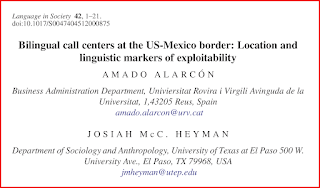RACIOLINGUISTICS

Follow me down the rabbit hole... I had to read a peer-reviewed linguistic research paper for my Introduction to Language Arts class. Oh holy buckets, that was NOT easy reading! I attempted to read the entire paper. I highlighted things. I tried to make sense of all the data. I read the paper, and re-read the paper, multiple times. And...because I'm extra...I also downloaded the other paper we could read for the same assignment. I only HAD to read one. But I figured I'd read the second one as well in case it was easier...or something. I consider myself a smart enough and well-read person. But the word "raciolinguistic" was all over this paper. It was easy enough to determine that this was a combination of the words "race" and "linguistic". But I wanted to know more. I googled the word. (From the image above) A raciolinguistic perspective seeks to understand the interplay of language and race within the historical production of nation-state/coloni

